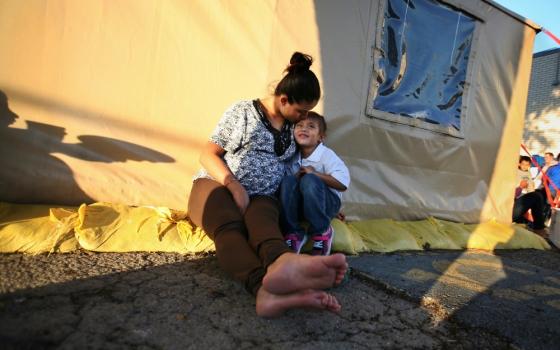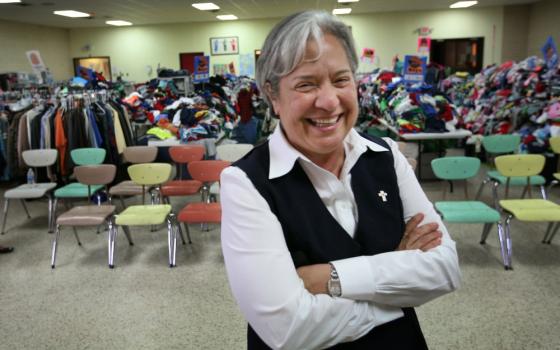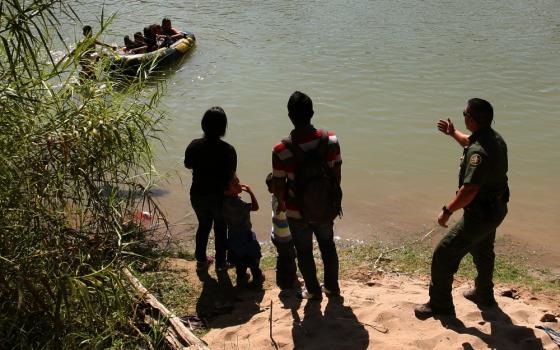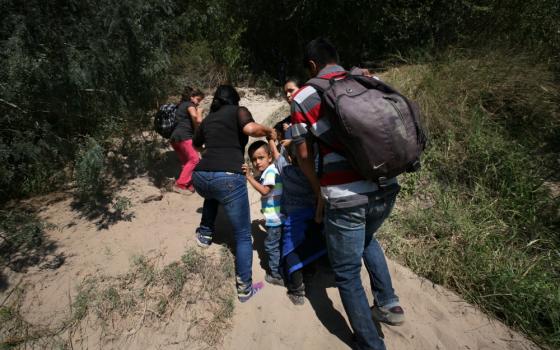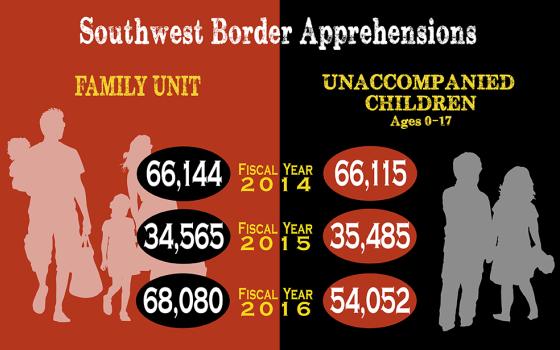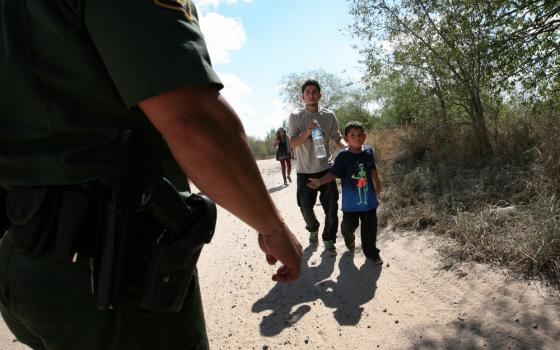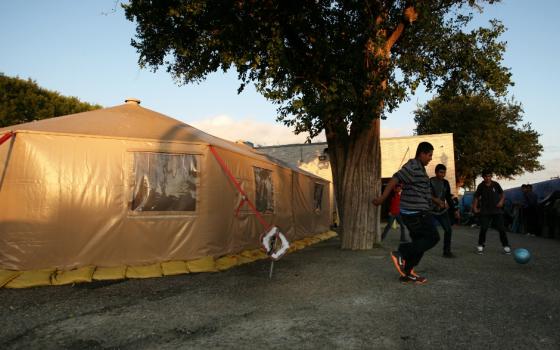They walked into the parish hall single file, clutching their children's hands and manila envelopes bearing bus tickets. Their faces appeared weary and somber, the result of treks covering more than 1,200 miles. Startled by a burst of applause as they entered, the group of 30 or so immigrants walked past smiling volunteers next to tables piled high with clothes. They took their seats and waited for the next step, hoping it would bring them closer to a better life than the one they'd left behind.
This was the third group to arrive on November 1 at the Humanitarian Respite Center in McAllen, Texas, part of a daily influx of immigrant families and unaccompanied minors at the southern border that has overwhelmed the facility.
The center at Sacred Heart Church serves as a way station for those just released from Border Patrol processing centers. Overcrowding forced the Humanitarian Respite Center's leaders to order a third air-conditioned tent, while the increasing number of immigrants led them to buy property that will house an expansion across the street.
"We just got a call that another group is on the way," said Sr. Norma Pimentel, executive director of Catholic Charities in the Rio Grande Valley. "We are going to hit 300 tonight."
In the last few weeks, the center hosted 200-plus visitors per day, compared to 60 to 100 daily visitors previously. This year has seen a 21 percent increase over 2015 but with two months left in the year, that number will likely rise. The last time the facility had a third tent was during the immigration surge of 2014.
U.S. Customs and Border Protection statistics for the Southwest border also show an influx of families and unaccompanied minors. For the 11 months ending in August, the Border Patrol apprehended 68,080 family units, nearly double the 34,565 for the same period in 2015. The 2016 numbers are slightly higher than the 66,144 intercepted during the surge of 2014.
Unaccompanied minor apprehensions in the same period rose 52 percent to 54,052, compared with 35,485 in 2015. That was 18 percent less than the peak two years ago.
While some media reports and local talk have linked the increase to the threat of Donald Trump's border wall or Hillary Clinton's plan to create a pathway to citizenship, only a handful of immigrants said the presidential election was the reason they made the trek.
"There are two, a man and a woman," Myrna Piñeda said, describing the candidates. Pronouncing Trump as "Troomp," the Honduran mother of two said she wanted to get to the U.S. before the door closed. "He wants to detain Hondurans and not let them cross."
The majority of those interviewed said the election was not a factor. Violence, extortion and threats of murder were still the main reasons they chose to come to the U.S., dodging gangs, kidnappers and Mexican immigration officials along the way.
At the respite center, a young father, who did not want to be identified, sipped soup with his 8-year-old son. He traveled 16 days by car from El Salvador after two men on a motorcycle rode up alongside him and pulled out a gun.
"Two men walking by saved me," he said, describing the lucky encounter with the potential witnesses whose presence stopped the attack. "I had to flee."
Dennis Bonilla leaned back in his chair with his arm protectively around his 9-year-old son, José. He ticked off similar reasons for leaving El Salvador: "Delinquents, gangs, anonymous people who would come to your house and say if you don't pay this amount we will kidnap you."
He and his son covered more than 1,486 miles by car, by truck and tractor-trailer, dodging Mexican immigration officers. "We didn't sleep trying to keep moving," he said. "It was a bitter experience."
Now he hopes to secure a work permit and dreams of a better education for his son.
'Todo esta bien'
The spike in new arrivals was evident along McAllen's border with Mexico, in a place called Rincon Village where Border Patrol Agent Isaac Villegas shuffled down dusty footpaths that led to the Rio Grande River. "Shhhh," he said, crouching behind a tree.
As two smugglers in an inflatable raft began unloading eight passengers, he slid down an embankment and ran to the scene. The smugglers, who could have passed for teenagers, started to paddle away with children still in the raft.
Villegas ordered them back, fearing the children could become potential kidnapping targets. "Deje los niños aquí!" he insisted several times. Finally, the smugglers relented and brought the children ashore before furiously paddling away with their arms.
The group of eight from the raft sat in the shade while Villegas reassured them that everything was fine. "Todo esta bien," he said.
Two women wiped away tears while huddling with their school-aged children, who had almost been whisked away by the smugglers.
"In Honduras, they tell you that you have to give them a certain amount by September 30 and if you don't, they kill you," said "Sofia," who did not want to be identified by her real name. "I had to sleep in the fields and on the streets without eating for several days."
In less than two hours, Villegas took custody of three more immigrants, including a woman who was eight months pregnant and complained of steady contractions. None tried to flee when he approached.
Although the immigrant surge of 2014 overwhelmed the Border Patrol, the agency says its infrastructure is more prepared now.
"There is a big difference between what we have going on right now and what we had in 2014," Supervisory Border Patrol Agent Dustin Araujo said.
During that period, so many families and unaccompanied minors overwhelmed the Border Patrol that nightly news images showed immigrants sandwiched together and sleeping on floors.
Many of the immigrants brought in by Villegas and other border agents will end up at Pimentel's respite center after being interviewed to make sure they don't pose a security threat or flight risk.
A shout-out from Pope Francis
The center opened during the 2014 immigration surge to give immigrants a safe place to rest while waiting for buses that at times did not leave McAllen until the next day. Waiting overnight at a bus station left riders, many whom were women traveling with children, vulnerable to criminal activity. Travelers rarely stay at the center more than one night.
Pimentel, a Missionaries of Jesus sister who oversees the respite center, has received awards for her work with immigrants. But her biggest honor came when Pope Francis gave her a shout-out during a television town hall on immigration last summer.
"I love you," the pontiff has said to her from the giant television screen place at the front of Sacred Heart Church. He also invited her to meet with him when he came to the U.S. a few months later.
While waiting for the next group to arrive, Pimentel bounced on her toes and looked around like an excited parent waiting for their child. She asked Josh Ramirez, the incident commander and Health and Code Enforcement director for the city of McAllen, when the third tent and mobile showers would arrive. Next week, Ramirez offered.
I prefer this Friday, Pimentel said. "The sooner the better."
Ramirez laughed and said he would see what he could do.
In the women's tents, women and children lay side by side with little space in between. But they didn't seem to mind. Adults smiled when they were offered toiletries, diapers, a change of clothes and a shower.
"It's beautiful, because we didn't expect to be received like this," said Lydia Yanes, an El Salvadoran mother of two. "If this wasn't here, we wouldn't know where to go."
Pimentel sees the center's expansion as the next necessary step to accommodate the rising immigration tide. Private donations that paid for the land will also fund the new building she hopes to open by next spring. She is confident that donations will also be there for a soup kitchen that is in the works, too.
When a volunteer remarked earlier that they were out of deodorant, Pimentel said she told her, "God will provide. Some way, somehow, someone will walk in and drop off some of the commodities that we need."
A few minutes later, Eli Fernandez, director of the center, came in with a new donation. As he dumped the contents on one of the tables, full size containers of men and women's deodorant spilled out of the plastic bag. The volunteer pointed that out to Pimentel but she was already across the room, solving the next problem.
[Nuri Vallbona is a freelance documentary photojournalist. She worked for the Miami Herald from 1993 to 2008 and has been a lecturer at the University of Texas and Texas Tech University.]
